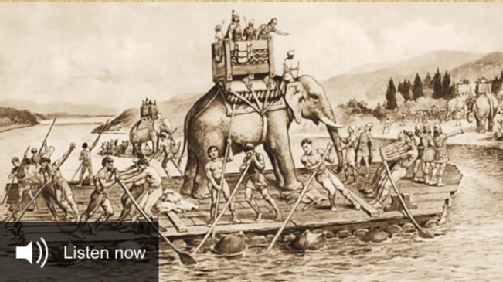Hannibal and the Second Punic War, 218–201 BC Audio Visual Resources
Hannibal
[Source: BBC Radio Four - In Our Time]
Melvyn Bragg and his guests discuss the life and achievements of Hannibal. One of the most celebrated military leaders in history, Hannibal was the Carthaginian general who led an entire army, complete with elephants, across the Alps in order to attack the Roman Republic. He lived at a time of prolonged hostility between the two great Mediterranean powers, Rome and Carthage, and was the Carthaginians' inspirational leader during the Second Punic War which unfolded between 218 and 202 BC. His career ended in defeat and exile, but he achieved such fame that even his enemies the Romans erected statues of him. Centuries later his tactical genius was admired and studied by generals including Napoleon and Wellington.
With Ellen O'Gorman (Senior Lecturer in Classics at the University of Bristol), Mark Woolmer (Senior Tutor in the Department of Classics and Ancient History at the University of Durham), Louis Rawlings (Senior Lecturer in Ancient History at Cardiff University). 43min.
Hannibal, the Snakes, and the Altar
[Created as part of the IATL funded project, 'Communicating the Classics via Digital Storytelling' at University of Warwick]
Tracking Hannibal
[Source: BBC Radio 4 - Inside Science]
(19:07 - end)
A little over 2200 years ago, Carthaginian general Hannibal Barca infamously led a huge army of elephants and horses across the Alps, almost to the gates of Rome. It has been celebrated as one of the most audacious military campaigns in history, but his exact route has always been subject to debate. This week further results from a consortium of disparate scientists have been published, supporting their preferred route taken by the grand army. Microbiologist Chris Allen from Queen's University talks Adam Rutherford through the "deposition of data", marking the passage of thousands of animals. What is the new evidence? A microbially recalcitrant, precisely dated, phylogenetically relevant layer of euphemism.


